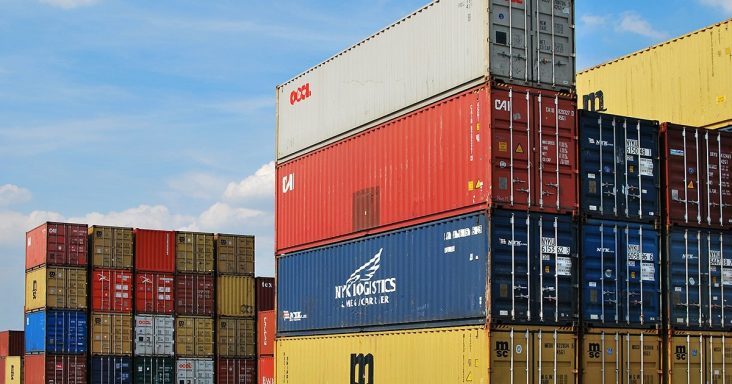Trade wars ‘likely to extend’ US freight recession
by April 14, 2025 3:43 pm 1,292 views

Recent reports suggest the announced and threatened tariffs may have boosted near-term shipping and import numbers, but may eventually lengthen the U.S. freight recession and reduce spending on trucks and other supply chain equipment.
President Donald Trump has in recent weeks announced a series of tariffs — often with post-announcement delays or changes — that includes a 145% tariff on imports from China with exceptions on certain tech goods. China responded with a 125% tariff on U.S. goods. Tariffs on goods out of Canada, Mexico and the European Union have also been announced, with exceptions and pauses that have muddied trade relations and created uncertainty in the global supply chain.
Freight sector uncertainty has reduced the share price of two Arkansas-based companies involved in global shipping and logistics. Shares of Lowell-based J.B. Hunt Transport Services (NASDAQ: JBHT) are down 12.4% between April 2 and 11, and shares of Fort Smith-based ArcBest (NASDAQ: ARCB) are down 14.4% in the same period. Hunt shares closed Monday at $137.82, up $4.94. ArcBest shares closed Monday at $62.46, up 14 cents.
Hunt is set to post first-quarter earnings Tuesday (April 15) after the markets close, and ArcBest is scheduled to report quarterly earnings April 29 before the markets open.
The Cass Freight Index posted Monday (April 14) indicates U.S. shipments declined 5.3% in March compared with March 2024, which was better than the 5.5% decline in February. The report noted the global freight market “is very much in the crosshairs of the trade war.”
“We expect a few more months of brisk demand for pre-tariff goods, followed by a tariff adjustment period with lower goods demand,” Cass noted in the report.
The pause in many announced tariffs also are disruptive, according to Cass, which estimates 20%-25% of U.S. freight activity is tied to international trade.
“The recent 90-day pause on most reciprocal tariffs will likely lead to more pre-tariff shipping in Q2,” according to Cass. “However, this will contend with adverse effects from the extreme tariffs on China, at this writing, and other tariffs. Volumes may also be temporarily supported in the coming months as consumers scoop up pre-tariff goods before prices go up. But thereafter, the trade war is likely to extend the for-hire freight recession as higher prices reduce goods affordability and consumers’ real incomes.”
The Cass Freight Index rose 13% in 2021, was up 0.6% in 2022, declined 5.5% in 2023, and was down 4.1% in 2024. Cass estimates the 2025 index, based on patterns through April, could be down 4% in 2025.
An April 11 investor note from Little Rock-based Stephens Inc., led by analyst Daniel Imbro, said data around “consumer demand destruction” because of uncertainties driven by tariff actions will be “very noisy,” but will likely point to problems for the freight industry.
“Taking a step back, we believe the recent tariff uncertainty will be a material headwind to the freight market as companies and consumers continue to sit on their hands,” the analysts noted.
The investor note included an expectation of increased prices for trucks — around $10,000 per truck. The rising prices and potential for reduced freight demand could result in a reduction in capital expenditures on shipping equipment.
“Since the March update, the administration has tariffed foreign-made vehicles 25%, which we would expect to hurt truck demand, particularly as rates remain depressed,” noted the Stephens report. “During earnings, we will be listening to see if demand has improved at all into April after the announcement of tariffs, or if this period of uncertainty has remained an overhang.”
Port of Los Angeles Executive Director Gene Seroka said in an April 11 media interview that the port — the busiest U.S. port by container volume — will see a decline in volume as early as May, and he expects a 10% dip in imports in the second half of 2025. About 40% of imports from China come through the port, according to a report from Transport Topics.
